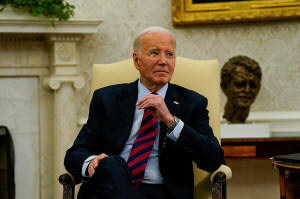|
The U.S. Environmental Protection Agency this spring finalized
new rules for models of semi-trucks, buses and other heavy-duty
vehicles released from 2027 to 2032 in a bid to cut 1 billion
tons of greenhouse gas emissions through 2055.
Heavy duty vehicles are big contributors to climate change,
accounting for around 7% of national emissions, according to EPA
data, and the standards formed a major part of Biden’s broader
plan to fight global warming.
“The EPA is forcing a switch to technology that simply does not
presently exist for these kinds of vehicles – and even if it
were someday possible, it will almost certainly have
consequences for your average American,” said Ryan Meyers,
senior vice president and general counsel for the American
Petroleum Institute (API).
The API is the top U.S. oil and gas lobby group and includes
Exxon Mobil as a member.
The National Corn Growers Association, the American Farm Bureau
Federation and the Owner-Operator Independent Drivers
Association said they had joined Tuesday’s suit, arguing in
favor of other methods to fight climate change like biofuels.
“EPA has tried to impose a one-size-fits-all approach to
addressing climate change by prioritizing electric vehicles over
other climate remedies like corn ethanol,” said National Corn
Growers Association President Harold Wolle.
The EPA did not immediately respond to a request for comment.
The API had already filed a federal lawsuit earlier this month
seeking to block the Biden administration's efforts to reduce
emissions from cars and light trucks. Under those rules, the
administration projects up to 56% of all car sales will be
electric between 2030 and 2032.
(Reporting by Jarrett Renshaw; Writing by Richard Valdmanis;
Editing by Shri Navaratnam)
[© 2024 Thomson Reuters. All rights
reserved.]
Copyright 2022 Reuters. All rights reserved. This material may
not be published, broadcast, rewritten or redistributed.
Thompson Reuters is solely responsible for this content.

|
|





